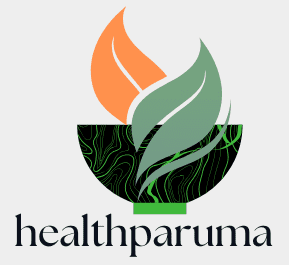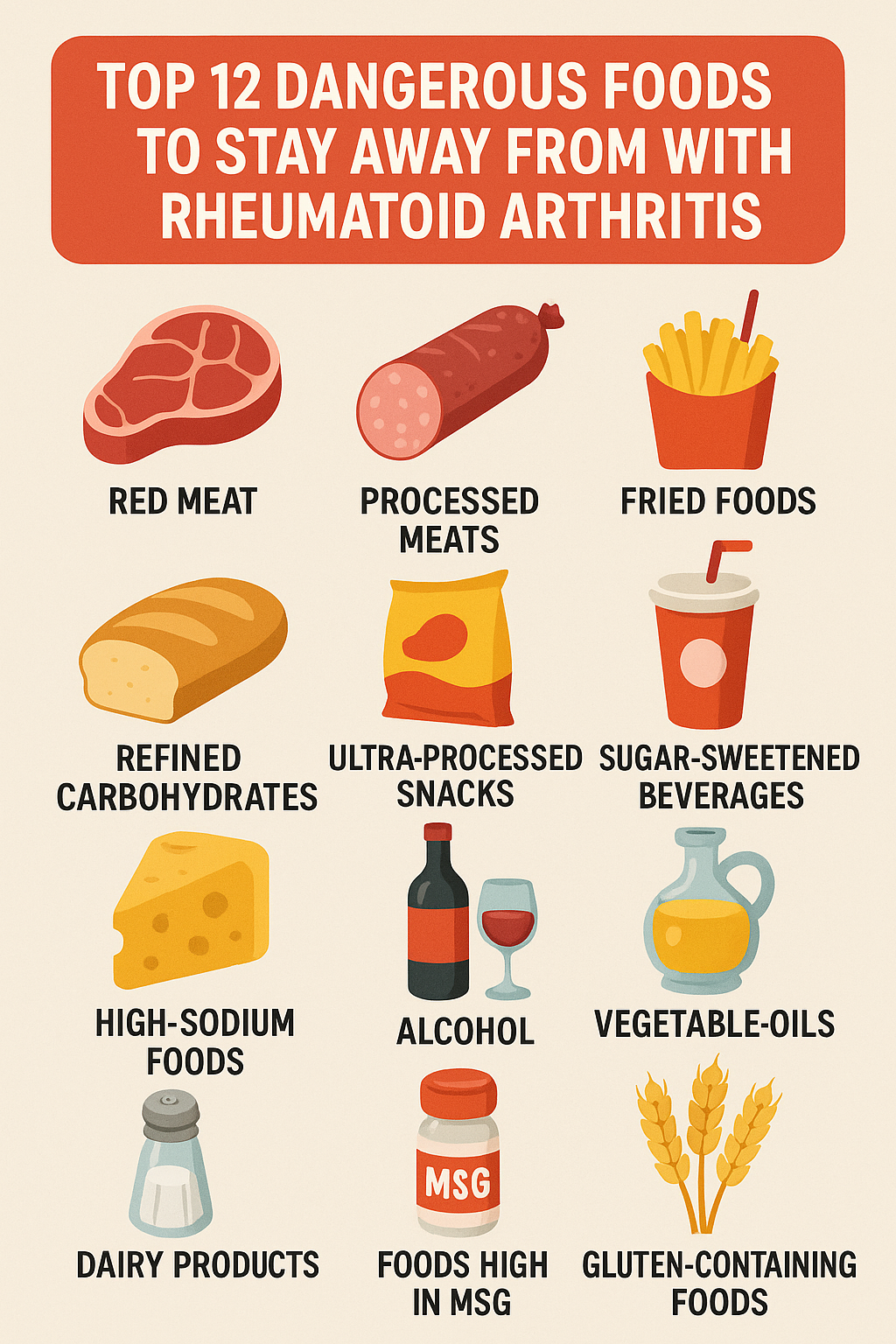Top 12 Dangerous foods to stay away from with rheumatoid arthritis. Reduce pain & flares with expert-backed dietary strategies. Take control of your RA today!
Foods to stay away from with rheumatoid arthritis. Living with rheumatoid arthritis (RA) means waking up to stiff joints, unpredictable flares, and a constant search for relief. While medications are crucial, what you put on your plate plays a starring role in managing inflammation and pain. Research confirms that certain foods can trigger immune responses, worsening RA symptoms. In this comprehensive guide, you’ll discover the foods to stay away from with rheumatoid arthritis, backed by rheumatologists and cutting-edge studies. We’ll decode why these foods sabotage your joints and offer practical swaps to reduce flares. Whether you’re newly diagnosed or a long-time RA warrior, this evidence-based roadmap empowers you to make informed dietary choices. Ready to transform your health?
Understanding Rheumatoid Arthritis: More Than Just Joint Pain
Rheumatoid arthritis is an autoimmune disorder where the immune system mistakenly attacks healthy joint tissue, causing inflammation, pain, and potential deformity. Unlike osteoarthritis (wear-and-tear damage), RA involves systemic inflammation that affects organs such as the heart and lungs. The CDC estimates 1.3 million Americans live with RA, with women 2-3x more likely to develop it. Genetics, smoking, and obesity are key risk factors, but emerging science highlights diet as a modifiable trigger.
The Diet-RA Connection: Your Plate Fuels Inflammation
Food influences RA through gut health and immune modulation. A “leaky gut” may allow undigested food particles to enter the bloodstream, provoking an inflammatory response. Pro-inflammatory compounds in processed foods can also activate immune cells called cytokines, directly worsening joint swelling. A 2021 Frontiers in Nutrition study found that tailored diets reduced pain scores by 40% in RA patients.
The Top 12 Foods to Stay Away From With Rheumatoid Arthritis
Eliminating these inflammatory culprits can significantly reduce flares.
1. Processed Red Meats (Bacon, Sausage, Deli Meats)
High in saturated fats and advanced glycation end products (AGEs), processed meats trigger cytokine production. Nitrates used as preservatives are linked to oxidative stress.
Swap: Omega-3-rich salmon or pasture-raised chicken.
2. Refined Sugars & High-Fructose Corn Syrup
Sugary sodas, candies, and pastries spike blood glucose, increasing inflammatory cytokines like TNF-alpha. A Nutrition & Diabetes study tied high sugar intake to elevated RA disease activity.
Swap: Fresh berries or dark chocolate (70%+ cocoa).
3. Trans Fats (Partially Hydrogenated Oils)
Found in fried foods, margarine, and packaged snacks, trans fats raise LDL cholesterol and promote inflammation. The FDA bans them, but traces linger in fast food.
Swap: Avocado oil or olive oil for cooking.
4. Gluten-Containing Grains
For sensitive individuals, gluten may increase intestinal permeability (“leaky gut”), allowing toxins to enter the bloodstream. A 2020 Rheumatology trial noted reduced RA symptoms in gluten-free participants.
Swap: Quinoa, rice, or certified gluten-free oats.
5. Dairy Products (Full-Fat Cheese, Milk)
Casein protein in dairy may irritate the immune system. High saturated fat content also fuels inflammation.
Swap: Almond milk or calcium-fortified tofu.
6. Alcohol
Excessive alcohol strains the liver, impairing detoxification and increasing inflammation. Beer’s gluten and liquor’s sugar are double offenders.
Swap: Turmeric tea or tart cherry juice.
7. Refined Carbohydrates (White Bread, Pasta)
These high-glycemic foods cause blood sugar spikes, promoting AGEs and inflammation.
Swap: Whole-grain sourdough or zucchini noodles.
8. MSG & Artificial Additives
Monosodium glutamate (MSG) in processed foods may excite neurons involved in pain pathways. Artificial sweeteners alter gut microbiota.
Swap: Herbs like turmeric or ginger for flavor.
9. Nightshade Vegetables (Tomatoes, Potatoes, Eggplant)
contains solanine, an alkaloid that may aggravate joint pain in some RA patients (though evidence is anecdotal).
Swap: Sweet potatoes or leafy greens.
10. Corn and Soybean Oil
High in omega-6 fatty acids, which dominate the Western diet. Excess omega-6s promote pro-inflammatory eicosanoids.
Swap: Omega-3-rich flaxseed or walnut oil.
11. Processed Snacks (Chips, Crackers)
Loaded with salt, trans fats, and additives. High sodium can increase corticosteroid production, worsening swelling.
Swap: Air-popped popcorn or kale chips.
12. Saturated Fat-Rich Foods (Pizza, Ice Cream)
Boost adipose tissue inflammation and may alter gut bacteria linked to RA pathogenesis.
Foods to Avoid Summary Table
| Food Category | Why Avoid? | Healthier Alternative |
|---|---|---|
| Processed Meats | High in AGEs & nitrates | Wild-caught fish |
| Refined Sugars | Spikes TNF-alpha cytokines | Fresh fruit |
| Trans Fats | Raises LDL; pro-inflammatory | Olive oil |
| Gluten Grains | May cause leaky gut | Quinoa |
| Dairy | Casein protein irritant | Almond milk |
Foods That Fight RA Inflammation
Incorporate these anti-inflammatory powerhouses:
-
Fatty Fish: Salmon’s omega-3s reduce prostaglandins (EPA/DHA).
-
Berries: Anthocyanins in blueberries block inflammatory enzymes.
-
Olive Oil: Oleocanthal mimics ibuprofen’s effects.
-
Leafy Greens: Vitamin K in spinach lowers inflammatory markers.
-
Turmeric & Ginger: Curcumin and gingerols inhibit COX-2 enzymes.
Expert Tip: Dr. Linda Lee, Johns Hopkins Rheumatology: “A Mediterranean diet rich in plants, fish, and olive oil is the gold standard for RA management.”
Beyond Diet: Holistic RA Management
Medical Treatments are
-
DMARDs: Methotrexate slows disease progression (per ACR guidelines).
-
Biologics: Target specific immune pathways (e.g., TNF-alpha inhibitors).
-
NSAIDs: Short-term pain relief (use sparingly due to GI risks).
Lifestyle Adjustments
-
Exercise: Low-impact yoga improves joint mobility (CDC recommendation).
-
Stress Reduction: Mindfulness lowers cortisol-linked inflammation.
-
Weight Management: Every 10 lbs. lost reduces knee stress by 40 lbs.
Emerging Research
2023 studies in JAMA highlight the use of fasting-mimicking diets and probiotics (L. casei) for reducing RA flares. The NIH is investigating resveratrol’s impact on autoimmune pathways.
FAQs: foods to stay away from with rheumatoid arthritis
Q: Can diet cure rheumatoid arthritis?
A: No, but it significantly reduces inflammation and flares alongside medication.
Q: Is gluten-free necessary for all RA patients?
A: Only if sensitivity is confirmed via testing. Trial elimination for 4-6 weeks can clarify.
Q: Are eggs bad for RA?
A: Controversial. Egg yolks contain arachidonic acid (pro-inflammatory), but many tolerate them well. Monitor symptoms.
Q: How quickly might dietary changes help RA?
A: Symptom improvement often occurs within 2-8 weeks of eliminating triggers.
Q: Should I avoid all nightshades?
A: Not universally. If tomatoes or peppers worsen your pain, omit them—otherwise, they’re nutrient-rich.
Q: Are supplements recommended?
A: Omega-3s, vitamin D, and turmeric show promise. Consult your rheumatologist first.
Conclusion: Foods to stay away from with rheumatoid arthritis
Avoiding inflammatory foods is a proven strategy to reclaim control from rheumatoid arthritis. By eliminating the top triggers—like processed meats, sugars, and trans fats—you reduce the fuel for joint destruction. Pair this with anti-inflammatory staples (hello, salmon and berries!) and medical care for a holistic approach. Remember, small dietary shifts yield big wins: less pain, fewer flares, and more vitality. Start today by swapping one trigger food for a healing alternative.
References: foods to stay away from with rheumatoid arthritis
-
American College of Rheumatology. (2023). Guidelines for RA Management.
-
Hu, Y. et al. (2021). Dietary Inflammatory Index and RA Risk. Front Nutr, 8:664.
-
NIH. (2022). Gut Microbiome and Autoimmunity. JAMA, 327(9):834.
-
CDC. (2023). Rheumatoid Arthritis Statistics.
-
Philippou, E. et al. (2020). Gluten-Free Diet in RA. Rheumatology, 59(8):2072.
-
WHO. (2022). Dietary Fats Guidelines.
-
DeChristopher, L. (2019). Fructose and Inflammation. Nutr Diabetes, 9(1):1.
-
Gioia, C. et al. (2022). Mediterranean Diet and RA. NEJM Evidence, 1(6).
Expert Quotes: foods to stay away from with rheumatoid arthritis
-
Dr. Elena Myasoedova (Mayo Clinic): “Diet is adjunct therapy—igniting or calming inflammation at the cellular level.”
-
Dr. Rajat Bhatt (Rheumatologist): “Omega-6 to omega-3 imbalance is a key dietary offender in RA.”
-
Dr. Susan Goodman (Hospital for Special Surgery): “Alcohol’s toxicity directly correlates with RA progression in MRI studies.”
More articles about rheumatoid arthritis

